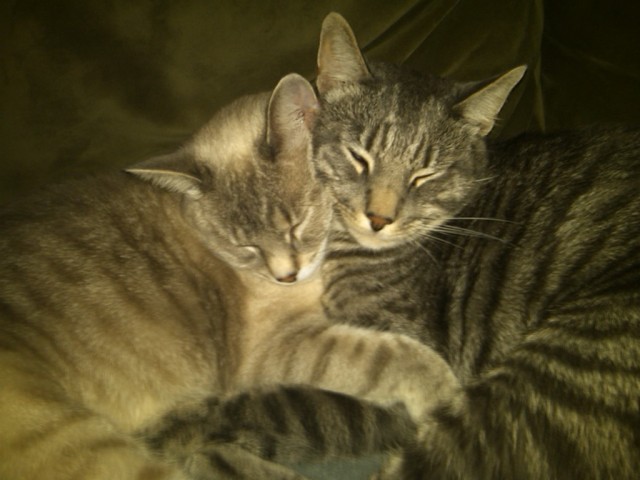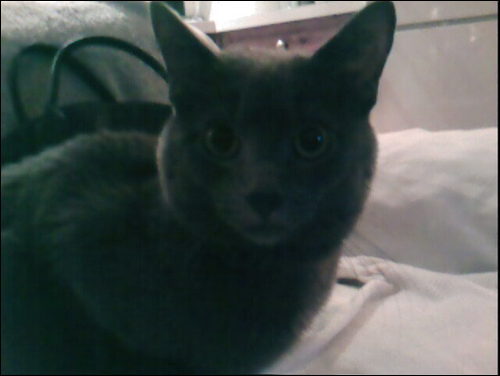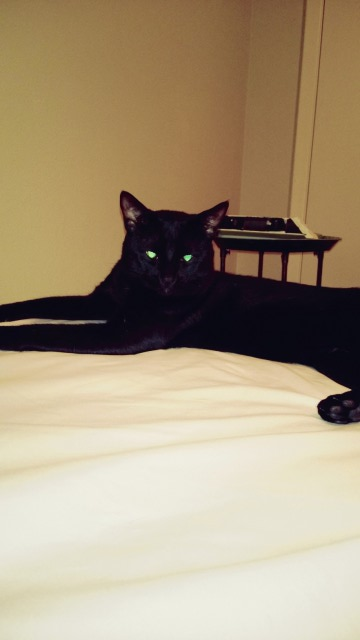QuestionMy cat has had conjunctivitis for about a week now. The infection started in the right eye, then spread to the left. I immediately began treatment with Terramycin but then also noticed a pronounced lethargy and took him to the vet three days ago. All the vet would say is the case should be treated as an "infection" and then prescribed Clavamox and Neo-Poly-Bac for the eye. Although my kitty is eating, he's *extremely* lethargic, and his response to any stimulus resembles slow motion, as he were in some sort of "twilight zone." Also, he sometimes cries, as if in pain, when I pick him up. I feel strongly that he is very ill and needs a more thorough examination, so I'm taking him to the vet again first thing tomorrow morning. In the meantime, could you give me your thoughts as to what might be causing these symptoms? I'm a veteran cat rescuer with lots of experience helping cats (including pink eye) but have never encountered a case with this combination of symptoms, e.g., pink eye/lethargy/pain. Note: kitty was tested for FIV/FelV, and results came back *negative*.
AnswerHi Abigail. Sorry to hear your kitty is feeling so under the weather. My best guess from this information is that the kitty may be suffering from one of the more virulent strains of calici virus. There are several strains of this virus. There is a vaccination against some of the strains, which kittens typically receive in combination with their distemper vaccines. However, the vaccine does not protect against all strains of calici virus, and some of them can be very nasty. Some of the main symptoms include extreme lethargy, eye infections, and sore muscles and joints that can lead to lameness and pain upon touch. A prolonged fever is often seen as well. Some strains cause quite a bit of sneezing, although nasal discharge is not usually a big problem. Calici virus also can cause extremely painful ulcers in the mouth, throat, eyes, nose and lungs. This is the most dangerous aspect of the disease. Cats tend not to eat because of mouth pain - a dangerous complication no matter the illness. And ulcers in the lungs also put the kitty at risk for pneumonia.
Unfortunately, as calici is a virus, it's not curable, and the disease must run its course. However, antibiotics are recommended to prevent infection from setting into any ulcers that may be present. Most cats are sick with calici for about a week to 10 days. After this, the virus goes dormant in their bodies, and the cat usually will become a carrier for life. Calici can become active during times of stress, although flare ups are not usually as severe as the initial infection.
Some vets recommend to give mega doses of Vitamin C to combat calici. Generally, start giving the cat 100mg of Vitamin C daily, and work the dose up 100mg each day until it causes diarrhea. Then back down to the highest tolerated dose. Most cats will tolerate about 400mg of Vitamin C just fine. Some people feel that 1000mg of Vitamin C would be necessary to help cats battle calici virus, and most cats' bowels won't tolerate this much, so there is some question as to how much Vitamin C therapy is really worth regarding calici virus. But holistic vets agree in general that supplementing with some Vitamin C is a good idea for kitties who are sick.
Your cat might need subcutaneous fluids if he has a fever or if he hasn't been drinking as much as usual. Off balance electrolytes caused by dehydration can also cause soreness and muscle cramps, which might be a source of his pain.
Your vet could certainly run some blood tests to see what his blood counts show and check for organ function. This can tell you if he seems to be suffering from a bacterial infection, viral infection or some kind of inflammation, and even cancer sometimes. They can also check to see how well his kidneys and liver are functioning.
If you're noticing a particular spot that's painful for him, you may also consider an x-ray. Two years ago, I noticed my cat grunted every time I picked him up around his stomach. I brought him to the vet who couldn't find anything during his exam. But I asked them to take an x-ray anyway. They discovered liver cancer. This isn't to say your cat has something this dramatically wrong with him, it just goes to show you that we as owners are more in tune with our kitties than the vets are. So if you have a hunch, ask the vet to follow through on it.
Best wishes!
Jessica

 What breed/mix is my cat?
QuestionSugar and Oliver
QUESTION: Hi,
Im wond
What breed/mix is my cat?
QuestionSugar and Oliver
QUESTION: Hi,
Im wond
 Worried that my cat has a UTI??
Question
Oscar
Hello,
My name is Danielle and I have t
Worried that my cat has a UTI??
Question
Oscar
Hello,
My name is Danielle and I have t
 One month old Kitten
Question
The one month old, aka
I have tried bef
One month old Kitten
Question
The one month old, aka
I have tried bef
 My cat pees on the carpet!
Question
My Cat Tigger
Hi I have a male cat he i
My cat pees on the carpet!
Question
My Cat Tigger
Hi I have a male cat he i
 Missing unnuetered cat for 11 days worried sick
Question
My Sweet Boy Bel
First I want to thank
Missing unnuetered cat for 11 days worried sick
Question
My Sweet Boy Bel
First I want to thank